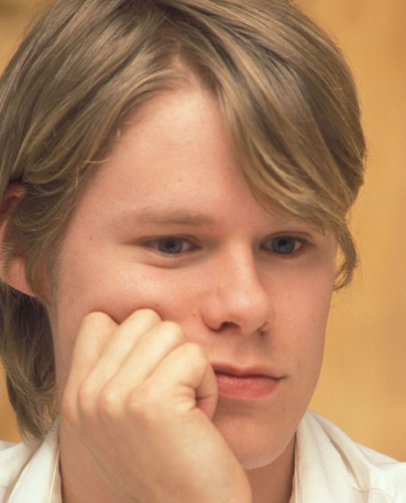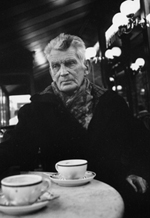
 It
was very early in the morning as Randy Harrison arrived with a cup of wake-up
in his hand. Sitting down at a handy picnic table with him to talk about
Endgame was an odd juxtaposition of realities. The Berkshire Theatre Festival
(BTF) rehearsal facilities are located in the sun-dappled woods, a long
way from the dark and claustrophobic setting of Endgame, the Samuel Beckett
play he is in rehearsals for. It plays at the Unicorn Theatre from July
6-24.
It
was very early in the morning as Randy Harrison arrived with a cup of wake-up
in his hand. Sitting down at a handy picnic table with him to talk about
Endgame was an odd juxtaposition of realities. The Berkshire Theatre Festival
(BTF) rehearsal facilities are located in the sun-dappled woods, a long
way from the dark and claustrophobic setting of Endgame, the Samuel Beckett
play he is in rehearsals for. It plays at the Unicorn Theatre from July
6-24.
So sitting in the outdoors, birds a-twittering, with a young actor in the prime of his life seemed to be a parallel universe. Harrison’s world is one filled with great purpose and possibilities. Beckett’s is not.
On stage Randy would transform himself into the character Nagg, who along with his wife Nell, are relegated to spend the evening in trashbins. Beckett’s play demands their acting be confined to their upper torsos only. Theatre – real theatre – demands a lot from a person, and leaving your own skin behind is part of it.
So, I asked Harrison, if you were interviewing yourself, what would you ask? “What are you working on,” he replied simply.
“And the answer is Endgame, the second Beckett play I have done here at the Berkshire Theatre Festival. The first one was Waiting for Godot two seasons ago. Of course everyone wants to know what it’s all about, but it is hard to reduce Beckett, Endgame especially, into a snappy sound bite.“
We’ll try. The BTF synopsis is that Endgame presents an absurdist’s vision of a future where time and reason are little more than suggestions, with characters as memorable as they are miserable. And wrapped up in the hilarity, in true Beckett style, is a brutally honest commentary on life and death. Never has “The End” seemed so bizarre- or so incredibly funny.
Perhaps there was a favorite line that would give us some insight. “One must live with the times,” he offered. How about, “Accursed fornicator, how are your stumps?” I replied. “Never mind the stumps,” he instantly parried. He knew his lines.
We turned to the production itself which is being directed by Eric Hill, and wondered if it would be traditional, unorthodox or something in between. “Eric Hill is always creative, but I wouldn’t call it unorthodox. He’s very, very involved with the text, helping us all get as specific an understanding of it as we can. While he is not skewing it any specific way, he is trying to light our way deeper and deeper into Beckett’s language.”
 And
what about accents, don’t they sometimes get in the way of audiences
understanding the words? “I think Nagg and Nell have a heightened
dialect that is not exactly American, but it’s not British either.
It’s sort of in between. But at the same time I think all the characters,
especially Hamm use different shadings of dialects. It all depends on
the phrase, since they are always playing with language, using it to mock
each other in different ways. But generally we are quite understandable,
even American, in our speech.
And
what about accents, don’t they sometimes get in the way of audiences
understanding the words? “I think Nagg and Nell have a heightened
dialect that is not exactly American, but it’s not British either.
It’s sort of in between. But at the same time I think all the characters,
especially Hamm use different shadings of dialects. It all depends on
the phrase, since they are always playing with language, using it to mock
each other in different ways. But generally we are quite understandable,
even American, in our speech.
One of the funniest lines in the play is Nell’s line that there is nothing funnier than unhappiness. Did he think that was true? “Yes, when you watch classic comedy, especially slap-sticky kinds of stuff, it’s all about frustration, embarrassment and pain and that rings true.” And it makes us laugh.
Perhaps the whole play is just a metaphor, it could be staged as taking place in a hospital. “It could be staged that way,” he agreed, “but with Beckett in general you have to think more and think less at the same time. I find if you spend forever trying to figure out the parallels or what metaphor it is – or try to put everything in a context that is naturalistic – or what does it mean – it just falls apart on you.
“At the same time I feel you (and the audience) can get it without getting it intellectually. You don’t need to draw perfectly straight parallels to understand Endgame,” Harrison explained.
This is perhaps the most important point about Beckett. Though set in a different time and place, and relating happenings in a phase of life that most of the audience has not yet reached, there are insights to be stored away for future reference.
We compared notes on how Beckett and Endgame speaks to us personally. Harrison felt that Endgame sends a message that “All our activities are sort of arbitrary time fillers between today and the day that we die. We just pretend that what we are doing is of any real significance. This helps us create a false justification for our existance.”
Good actors are different from you and me. They have to spend their days thinking about these eternal questions while we enjoy the latest gossip from the twitterati.
Another interesting thing about Endgame is that Randy is playing an older character, in fact a very, very old one. “That was Eric Hill’s intention, and we will be playing older. What he wanted was the physical energy that younger people are more capable of. That brings more to the role than just the struggle of age that is normally conveyed. Being in that trashcan pulling yourself up while kneeling or squatting.”
Nobody ever talks about the physical demands of the role, I offered. “Eric has been talking about it a lot – Beckett often puts his actors in difficult positions. Look at Not I for example.” (Not I takes place in a pitch-black space illuminated only by a single beam of light. This spotlight fixes on an actress’s mouth about eight feet above the stage. The actor can not move from the set position for twenty minutes.)
“Beckett tends to put his actors in these difficult, exaggerated positions because I think he likes what it forces to happen to the actor. The audience gets more when the actor is in such an extreme state of struggle,” Harrison ventured. Beckett was a sadist, I thought to myself.
Beckett wrote Endgame when he was 51 or so, and at the moment that the last of his immediate family had passed away. “I don’t think he was in a very good mood,” said Harrison, but yet there is an enormous amount of humor in it.
“I know a lot of people find Beckett bleak, and I understand why they say that, but I don’t. I find him comforting because he can see the worst and the hardest things about being human and still laugh at it. There is even some joy in it, and amusement at the absurdity of it.”
Harrison’s point is well taken. The exchanges between Hamm and Clov, and towards Nagg and Nell often contain great witticisms wrapped in barbs and insults. One has to look beyond the hurt for the humor.
“One of the things that separates Beckett from other playwrights is that he is not afraid to look at the hardest things, to question them, to examine them and find the humor in them. Look at Nagg and Nell, they are the heart of the play. There’s real care between the two of them. The juxtapositions between them and that of Clov and Hamm are so different. Nagg is trying to save things for her, and even when he is in fear for his life he has the nerve to ask for a sugar plum for her. Their love for one another warms the otherwise grey landscape that Beckett draws.”
When Harrison was preparing for Waiting for Godot in 2008, the production had gained an extra week of rehearsal time thanks to an NEA grant, but this time the company had to work within a shorter time frame. I wondered if that made a difference, did he feel there was enough rehearsal time?
“I do,” he replied, “because – thank God – everybody was off-book (had learned all their lines) by the second day of rehearsal. Nagg and Nell – Tanya Dougherty plays Nell - don’t have that much to remember so we were pretty much ready. And Mark Corkins and David Chandler as Hamm and Clov were ready to go.
“It is also simpler to stage since it is only Clov who really moves around, the other characters are not ambulatory.”
This means they escaped the first week’s routine of just getting the basics down and could immediately turn to the staging, polishing and plumbing he depths. Generally speaking, the more time there is for that, and the harder the actors work, the better the end result.
Coming up for air after that immersion in the world of Beckett, I wondered what Harrison did once the play was up and running besides the performances. “I hike MonumentMountain all the time, and love to just soak in the Berkshire beauty,” he offered. “And I have been reading a lot.”
Since his last appearance in the Berkshires, Harrison has appeared as Andy Warhol in Pop, a musical at the Yale Rep in New Haven. “I love Warhol and his factory, I learned a lot.” Perhaps some day he will do a musical at BTF? “Someday. Who knows.” Harrison prefers the challenge of plays like Endgame which exercise his mind as well as his acting skills. “But once every year or two, I really enjoy doing a musical,” he adds.
I wondered if he would tell me something nobody knew. “Well, I just spent a month on a farm in France, down in the dirt and loving every minute of it. They had sheep, pigs, rabbits, chickens, and a lot of vegetables to go with them.” (General laughter)
Wrapping up our talk, I wondered what role has brought him the most satisfaction. Without hesitation he answered: “Lucky, in Waiting for Godot.”
Most everyone would agree with that assessment. And Beckett watchers in the Berkshires are curious to see his Nagg in Endgame as Randy Harrison continues to explore the classic works of theatre.
The Berkshire Theatre Festival’s Endgame is in rehearsal now. Berkshire
Beckett devotees will make their way to the Unicorn Theatre to see the
latest twists given this classic. Eric Hill Directs and the cast consists
of Mark Corkins as Hamm, David Chandler as Clov, Randy Harrison as Nagg
and Tanya Doherty as Nell. (Previews July 6-9, Opening July 10 and running
until July 24).For ticket information and reservations ontact the BTF
Box Office at 413-298-5576 ext. 33 or visit www.berkshiretheatre.org
for more information.
Edited by Marcy